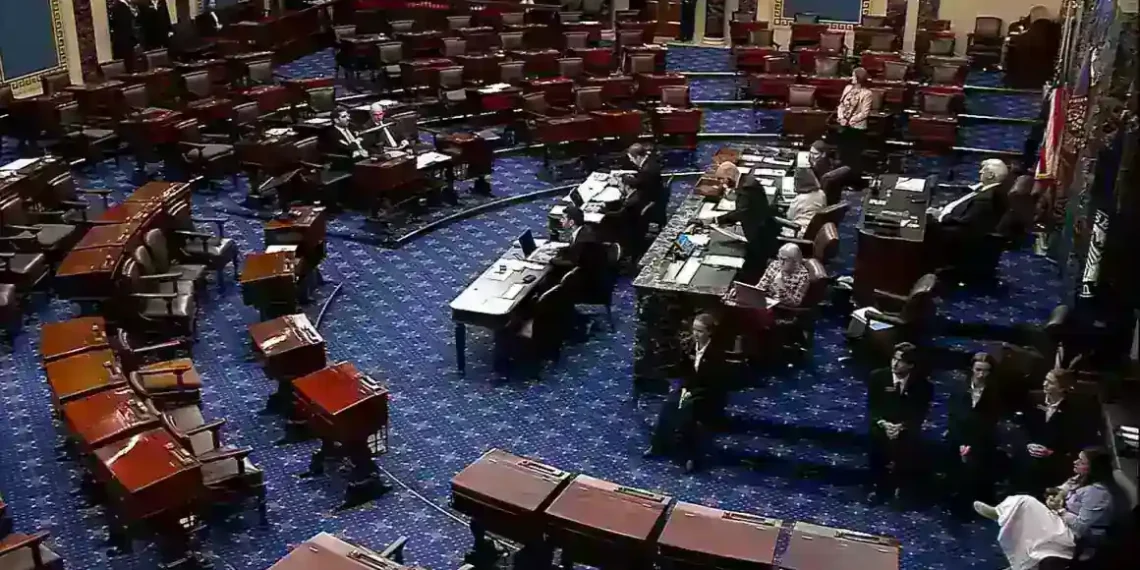Senate Approves $9 Billion in Spending Cuts, Sending Trump’s Package Back to House Ahead of Deadline
Foreign aid and public broadcasting on the chopping block as House faces Friday deadline
The U.S. Senate has approved a sweeping $9 billion package of federal spending cuts championed by former President Donald Trump, sending the measure back to the House just days before a critical deadline.
The legislation—which slashes funds from foreign aid programs and public broadcasting—is part of Trump’s broader push through the Department of Government Efficiency (DOGE) to roll back previously approved government spending.
What’s in the Package?
The bill, narrowly passed in the Senate by a 51–48 vote early Thursday morning, includes:
- $8 billion in cuts to foreign aid, largely targeting the U.S. Agency for International Development (USAID), and
- $1.1 billion in cuts to the Corporation for Public Broadcasting, which helps fund outlets like NPR and PBS.
The cuts were advanced under special budget reconciliation rules that allow Republicans to move the package forward without needing Democratic support. But the House must pass the revised bill by Friday to meet those rules.
Internal GOP Divisions Surface
While most Senate Republicans supported the plan, a few key GOP senators voiced strong objections. Senators Susan Collins (R-Maine) and Lisa Murkowski (R-Alaska) voted against the final bill, citing concerns over transparency and congressional oversight.
“The rescissions package has a big problem—nobody really knows what program reductions are in it,” Collins said after the vote.
Murkowski warned that the process bypassed normal legislative review, saying, “We’re lawmakers. We should be legislating. What we’re getting now is direction from the White House.”
PEPFAR and Tribal Radio Funding Spared
To win over hesitant Republicans, the Trump administration made key concessions before the vote:
- A proposed $400 million cut to PEPFAR, the U.S. global AIDS relief program, was dropped after bipartisan pushback.
- Senator Mike Rounds (R-S.D.) backed the bill only after securing an agreement to protect funding for tribal and rural radio stations in South Dakota.
“We wanted to make sure tribal broadcast services in South Dakota continued to operate, which provide potentially lifesaving emergency alerts,” Rounds said on X (formerly Twitter).
House Must Now Act Fast
The House initially passed the bill in June, but must vote again after the Senate made changes—specifically adopting a substitute amendment that modifies the House version. Speaker Mike Johnson has urged the House to move swiftly.
“We’re going to process whatever they send us, whenever they send us,” Johnson said, acknowledging the House GOP’s tight majority.
If the House approves the Senate version before the Friday deadline, the bill will head to Trump’s desk. He is expected to sign it immediately.
Vice President Vance Breaks Ties
Vice President JD Vance played a pivotal role in advancing the bill, casting tie-breaking votes during several procedural hurdles earlier this week.
His involvement underscores how narrow the margin was—and how contentious the issue remains within the Republican ranks.
What’s Next?
This marks the second time in July that the House has had to quickly respond to Senate-altered legislation ahead of a key deadline. The push to reduce foreign aid and public media spending could signal more aggressive moves by Trump-aligned Republicans to reshape federal funding priorities.
The outcome of Friday’s House vote will determine whether these cuts become law—or stall under internal party disputes.
This article was rewritten by JournosNews.com based on verified reporting from trusted sources. The content has been independently reviewed, fact-checked, and edited for accuracy, neutrality, tone, and global readability in accordance with Google News and AdSense standards.
All opinions, quotes, or statements from contributors, experts, or sourced organizations do not necessarily reflect the views of JournosNews.com. JournosNews.com maintains full editorial independence from any external funders, sponsors, or organizations.
Stay informed with JournosNews.com — your trusted source for verified global reporting and in-depth analysis. Follow us on Google News, BlueSky, and X for real-time updates.














